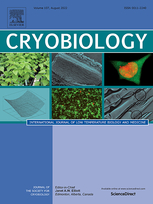
Effect of cooling on the mobility and function of human spermatozoa.
Author(s) : CHANTLER E., ABRAHAM-PESKIR J. V., LITTLE S., et al.
Type of article: Article
Summary
Human spermatozoa were cooled from 37 to 0 °C at 10 °C/min in 5 °C steps with 1 min equilibration at each step. Spermatozoa were held at 0 °C for 5 min and then rewarmed at the same rate. No significant effect of cooling on the straight-line velocity was found using computer-aided semen analysis. The physiological function of spermatozoa was examined before and after cooling using hypoosmotic swelling, ionophore-provoked acrosome reaction, and binding to fragments of human zonae pellucidae. When spermatozoa were cooled and rewarmed in seminal plasma there was no significant change in either the ionophore induced-acrosome reaction or the binding to zona pellucida fragments. When spermatozoa were fractionated by centrifugation through Percoll an increased response in both was seen. However, following cooling and rewarming, a significant decline in the response of both occurred. Mobility alone is thus not a reliable predictor of changes in other physiological functions of spermatozoa following cooling. Furthermore, short-term cooling appears to have no significant detrimental effect and cold shock may be avoided in the clinical context by controlled cooling and warming.
Details
- Original title: Effect of cooling on the mobility and function of human spermatozoa.
- Record ID : 2001-2513
- Languages: English
- Source: Cryobiology - vol. 41 - n. 2
- Publication date: 2000/09
Links
See other articles in this issue (1)
See the source
Indexing
- Themes: The influence of refrigeration on cells, tissues and organs
- Keywords: Sperm; Physiological property; Cryobiology; Cooling; Man
-
Physiological-biochemical characteristics of yo...
- Author(s) : SAVUSHKINA S. I., ANAN'EV V. I.
- Date : 1991
- Languages : Russian
- Source: Rybn. Hoz. - n. 12
View record
-
Intermittent whole-body cold immersion induces ...
- Author(s) : SOLIANIK R., SKURVYDAS A., MICKEVICIENE D., et al.
- Date : 2014/10
- Languages : English
- Source: Cryobiology - vol. 69 - n. 2
View record
-
Use of sperm stored under hypothermic condition...
- Author(s) : GRISCHENKO V. I., PETRUSHKO M. P., PINYAYEV V. I., et al.
- Date : 2001/07
- Languages : English
- Source: CryoLetters - vol. 22 - n. 4
View record
-
Osmotic effects on ram and human sperm membrane...
- Author(s) : CURRY M. R., WATSON P. F.
- Date : 1994/02
- Languages : English
- Source: Cryobiology - vol. 31 - n. 1
View record
-
Gender-specific cold responses induce a similar...
- Author(s) : SOLIANIK R., SKURVYDAS A., VITKAUSKIENE A., et al.
- Date : 2014/08
- Languages : English
- Source: Cryobiology - vol. 69 - n. 1
View record
